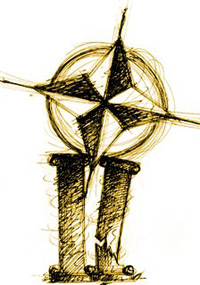
At the last North Atlantic Treaty Organization summit in Wales two years ago, the villain of the piece was clear: Russian President Vladimir Putin, who just months earlier had annexed part of Ukraine.
This time Putin is having to share the stage with one of the alliance's own, German Foreign Minister Frank-Walter Steinmeier.
Leaders, military officials, security experts and others attending the alliance's two-day summit in Warsaw expressed deep concern, either directly or by implication, over Steinmeier's recent attack on NATO military exercises in Poland and the Baltic States as "saber-rattling and war cries."
Steinmeier's comments were quickly overridden by German Chancellor Angela Merkel. Nevertheless, they have crystallized fears about the wider lesson of the U.K.'s recent surprise vote to leave the European Union: namely, that popular support for the Western alliance and values that NATO protects may be evaporating, opening the way for electoral upsets and fundamental policy shifts that until recently seemed inconceivable.
With elections coming up in the United States, France and then Germany over the next year, much of the discussion at a parallel summit forum by think tanks to discuss NATO's future was about the need for the alliance to explain all over again what it was for. Donald Trump, the presumptive Republican candidate for President in November elections, has backed Brexit and questioned the continued value of NATO to the U.S.
"The German people have been told that NATO is saber-rattling," said former secretary of state Madeleine Albright, as she attacked "myopic voices" on both sides of the Atlantic. "As the U.K. referendum reminds us, it is not enough to sit back and assume that people will understand the logic of international engagement."
At a summit characterized by anxieties over the alliance's continued unity, few seemed concerned about the post-Brexit contribution to NATO from the U.K., which has one of the alliance's most capable militaries. Indeed, most expected Britain to become more committed to the alliance as it loses influence on the continent by leaving the EU.
That provided only limited comfort, however,as officials committed to NATO worried aloud about its ability to hang together. "At this point of time we cannot afford to disagree on defense concerns," said Swedish Defense Minister Peter Hultqvis. Sweden is not a NATO member, but has been strengthening ties due to concerns over Russian behavior.
The summit was characterized by repeated commitments to unity by the alliance's 28 members, soon to be 29, once membership of the former Yugoslav republic, Montenegro is ratified.
"The most serious threat to NATO unity is also its best hope, Germany," Jonathan Eyal, associate director of the U.K.'s Royal United Services Institute, said at the NATO forum. Merkel has taken a leading role in crafting the Western response to Russia. Steinmeier's comments, however, show that his Social Democratic Party is preparing to make opposition to NATO policy a campaign issue in next year's election, according to Eyal. The SPD look highly unlikely to win that race, but no vote can now be taken for granted after Brexit, he said.
"We need Germany to understand" the importance of committing to the defense of NATO's eastern members, said Poland's Foreign Minister Witold Waszczykowski, in a speech that expressed Polish concerns.
In France, candidates are vying for support ahead of presidential elections next year, with the nationalist, anti-EU National Front's Marine Le Pen calling for France to leave NATO.
Even if, as expected, Le Pen does not defeat what she calls France's "globalist" parties to win the presidency, there is cause for concern. France already takes a more Steinmeieresque view of Russia. On Friday, after holding a call with Vladimir Putin, President Francois Hollande insisted that Russia was "not a threat," but rather "a partner that can at times, it's true as we saw it in Ukraine, use force."
French officials also indicated after the Brexit vote that they may revive a bid to create an EU version of NATO's command headquarters, a move the U.K. has long blocked and which NATO officials fear would sap commitment to the alliance.
Seen from Moscow, NATO's travails and the growing nationalism and populism that feed them only seem to validate Putin's view of a world that's returning to competition between nation states, rather than NATO's democracy-promoting internationalism, said Andrei Kortunov, director general of the Russian International Affairs Council.
"If one of Europe's hardline nationalists were here," said Kortunov of the NATO forum, "they would say that all these people don't know what they're talking about."
Comment by clicking here.
Marc Champion, a Bloomberg columnist, writes editorials on international affairs. He was previously Istanbul bureau chief for the Wall Street Journal. He was also an editor at the Financial Times, the editor-in-chief of the Moscow Times and a correspondent for the Independent in Washington, the Balkans and Moscow. He is based in London
Previously:
• 04/06/16: Trump asks right question on NATO, botches answer
• 02/23/16: Britain is fracturing Europe in pursuit of ghosts
• 02/17/16: The Syrian truce is dead and Russia's in charge
• 10/27/15: Does Vladimir Putin have an endgame in Syria?
• 10/20/15: Putin's coming win in Moldova is foreshadowing for Ukraine



 Contact The Editor
Contact The Editor
 Articles By This Author
Articles By This Author